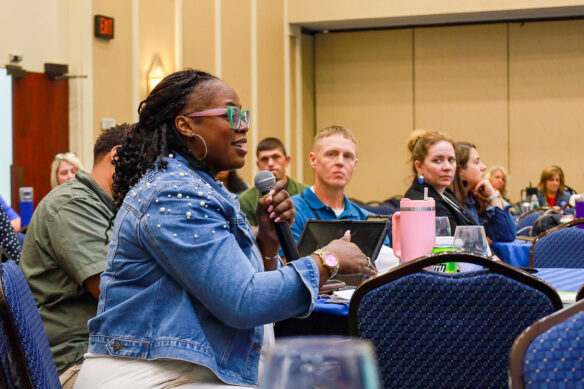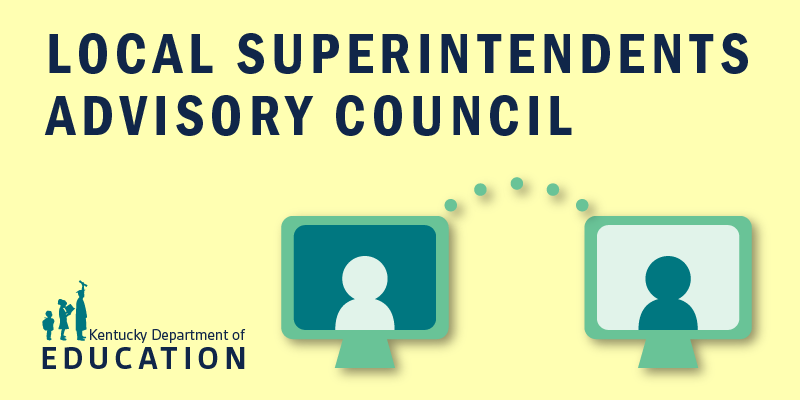
An attendee of the Persistence to Graduation Summit asks a question to a group of recently graduated high school students who were serving on a panel at the event. Photo by Fiona Morgan, Kentucky Department of Education, June 13, 2025
The Kentucky Department of Education’s (KDE’s) Division of Student Success, from the Office of Continuous Improvement and Support, hosted its 2025 Persistence to Graduation Summit in Lexington on June 12-13 with more than 300 Kentucky educators attending.
The professional development opportunity allowed educators to learn how they can better support students who may experience challenges to reaching graduation.
Christina Weeter, division director in KDE’s Office of Continuous Improvement and Support, said the summit was a huge success and participants had a wide variety of sessions from which to choose.
Superintendents, principals, educators, social service and mental health professionals, as well as community partners from across Kentucky led 25 professional learning sessions over the two days. They shared information on such topics as student transition and re-engagement, alternative education programming, well-rounded educational opportunities, safe and healthy student initiatives and effective use of education technology.
Four recent Kentucky public school graduates participated in a panel discussion about their school experiences during the summit.
Weeter said hearing from the graduates was a great way for Kentucky educators to get feedback directly from the source.
“Our graduates shared some helpful insight for teachers to use in the classroom and help them better connect with students,” Weeter said. “We are always encouraging teachers to continue learning in any way they can.”
The four panelists were:
- Madison Stone – A first-generation college student at Kentucky State University, Stone is completing her degree in social work. As a student in Fayette County Public Schools, she attended both the traditional high school and completed her diploma at Martin Luther King, Jr. Academy, an alternative education program.
- Lisa Abrampah – She recently graduated from The Craft Academy for Excellence in Science and Mathematics as well as Frederick Douglass High School (Fayette County). Abrampah is a member of the Commissioner’s Student Advisory Council and a Ghanaian immigrant. She will attend the University of Kentucky in August.
- Luke Harding – He graduated from Great Crossing High School (Scott County) in 2024. While in high school, Harding earned dual credits from Bluegrass Community Technical College and received a scholarship to Thomas More University.
- Quincy Elliott – A 2023 graduate of East Carter County High School, Elliott is a sophomore at Transylvania University. He is majoring in political science and minoring in education.
During the panel discussion, graduates were asked about what makes students feel disconnected in the classroom. Elliott said it can happen when teachers don’t incorporate different types of people’s experiences and perspectives in the classroom.
“We live in a world where it’s very difficult to incorporate every single culture or every single identity, but there are times even in my own experiences that I didn’t see myself,” Elliott said. “I didn’t see people who looked like me or who are like me, so [teachers should try] to incorporate everybody’s own unique experiences.”
Harding said he felt more connected when he was involved in career and technical education opportunities. Abrampah said teachers should always encourage students to join extracurricular activities.
“When you don’t know people in your school, you’re going to feel disconnected,” Abrampah said. “Educators should encourage students to join a sport, do a club, found a club or something else they’re interested in. Because when you’re able to find a space like that, you connect with those people just off your shared interest, and you just want to be at school more.”
Elliott and Harding said they felt more connected in the classroom when they felt comfortable enough with their teachers to have conversations with them as they’re teaching, to interject when they had questions and respond to those answers in a dialogue fashion.
“One of the biggest things for me, and really my learning experiences, is feeling like I was helping lead the class in some fashion,” Elliott said. “It’s important for students to express how they feel and share their interpretations of certain lessons.”
Elliott said he felt more connected with teachers when they showed students that they make mistakes and that they’re human too. He said it sets a good example for students to admit when they make mistakes and correct those mistakes.

Graduate panelist Lisa Abrampah, second from right, talks to attendees about how they can help students feel more connected in school at the 2025 Persistence to Graduation Summit, which was held in Lexington on June 12-13 . Photo by Fiona Morgan, Kentucky Department of Education, June 13, 2025
Giving Students More Voice
Multiple panelists said they feel more connected in school when they feel heard. They said students feel valued when their ideas are listened to and their opinions are respected.
When the panelists were asked what they would change in schools, they all agreed that every school should have a student government.
Elliott said his school did not have a student government when he attended. He always wished for that opportunity and believes that every school should involve students more in important decision making.
Harding was involved in his school’s student government but said that students were only involved in minor decision making, such as how to decorate for prom.
“That’s not enough power for anyone to actually consider it as something to do,” Harding said. “Schools could have a three-way meeting between teachers, administrators and students for them to have a conversation once a semester or something and turn it into an opportunity for students to share their voice a bit more powerfully than just with the one chaperone that’s in charge of the student government.”
Stone said that having school town halls would be another way to get all students involved in decision making, not just the ones in student government.
“I think the idea of a student council kind of intimidates students a little bit,” Stone said. “Some kids may not want to be as involved to be on student council, but they do have things to say. They do feel like there are some things that could change. Whether it be a suggestion box or something else, I think there should be a little bit more of an aspect for students to choose to change the things that they have to do with.”
Weeter encouraged educators to come to the 2026 Persistence to Graduation Summit, which will be held next summer.




Leave A Comment